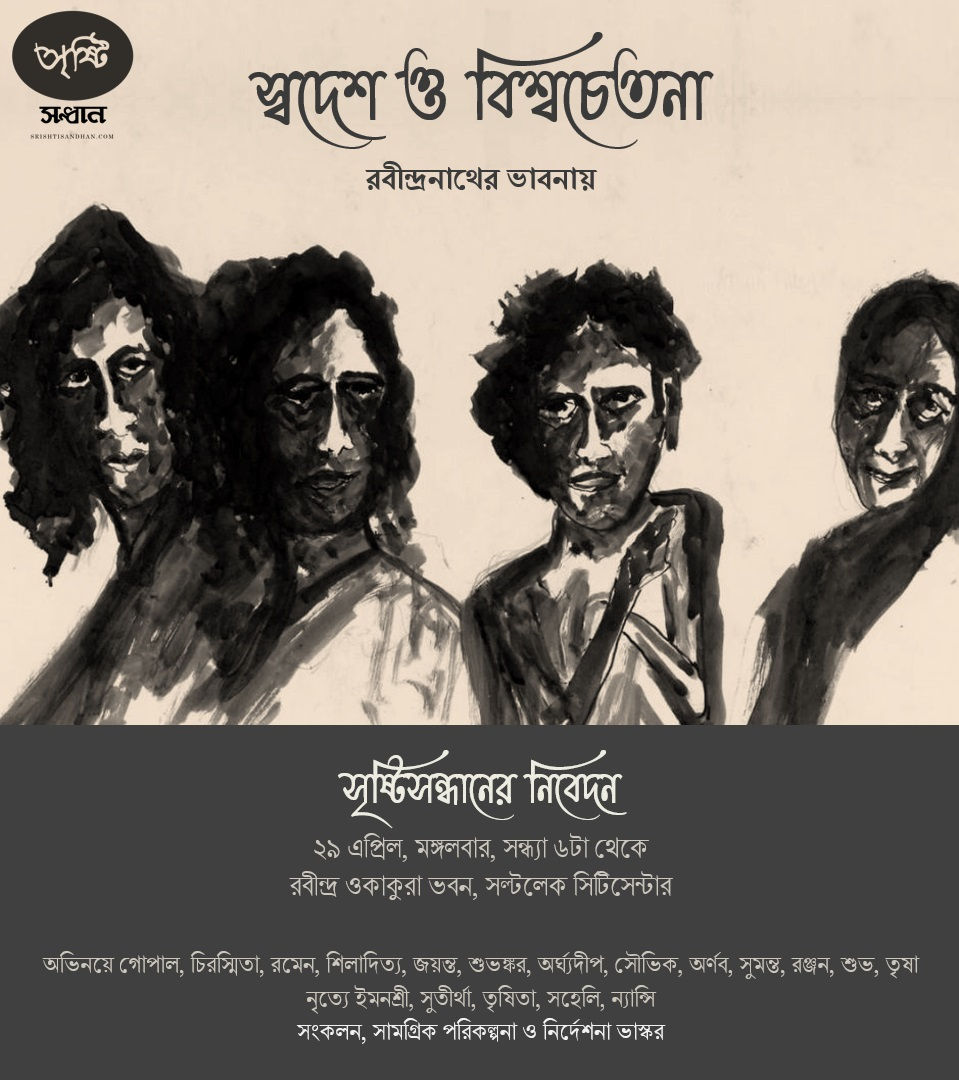
Performances
Bhaskar has grown up in a multidisciplinaryand cultural environment. From a very early age, he was involved in cultural activities in the locality under the guidance of his parents and started performing in various local cultural programs and short plays. During his school days he was an active member organizing various cultural programs on different occasions in the school, such asSaraswati Puja, Annual Prize Distribution Ceremony and others. He was also a part of local Group Theatre and other cultural initiatives.
During his college days his passion for cultural activities continued and he acted and directed various plays representing his department and University programs. He also started publishing a little magazine named Srishti in the locality. Srishti also used to conduct Art exhibitions with budding and established artists for several years. All these initiatives gradually turned into present day Srishtisandhan.
After the formation of Srishtisandhan in 2003 and the Academy thereafter, all these initiatives gained momentum. Now Srishtisandhan Academy hosts various programs, workshops and training sessions for the underprivileged children as well as for matured Photography, Movie and Theatre enthusiasts.
Srishtisandhan Academy hosts its annual program every year with a new Drama Production, along with several in-house programs over the years where the students and teachers of the academy participates. Some of the recent ones are “Swadesh O BiswaChetona”, “Bandhan O Mukti” and “Majoritarianism”. There are always a few more upcoming productions in the making.
Bhaskar has also directed a full-length feature film named "Chashma" along with many musical, travel and documentary videos.
জীবনানন্দ দাসের কবিতা
কবিতা গুচ্ছ
(শ্রীজাত, সুনীল গঙ্গোপাধ্যায়, নীরেন্দ্রনাথ চক্রবর্তী)
আলেখ্য - শারদীয়া
কবি শুভ দাশগুপ্তের শারদীয়া, সঙ্গে মহালয়ার কয়েকটি গান, দেবীর মৃন্ময়ী এবং চিন্ময়ী রূপের একটি হৃদয়স্পর্শী উপসস্থাপনা
গল্প পাঠ - রাজকাহিনী - শিলাদিত্য
অবনীন্দ্রনাথ ঠাকুরের রাজকাহিনী, একটি চিত্রময় রূপকথা।
যেন কোন ভুলে যাওয়া অতীতে, কোন দূর রাজ্যে, ঘটে যাওয়া রাজ ইতিহাস, তার অবয়ব হারিয়ে অন্ধকারে জোনাকির মত উড়ে বেড়াচ্ছে ।
পাঠ – ভাস্কর, শর্মিষ্ঠা, চিত্রণ – শুভ কামিল্যা, সম্পাদনা – ভাস্কর

Bandhan o Mukti
“Bandhan o Mukti” was also a compilation of three plays by Rabindranath Tagore. Control and Freedom are two essential elements of human lives. They can be in various forms and various layers. They can be found in our everyday lives, in our traditions and activities. They can also be found in our quest for self, in our knowledge, our love, our society and in every nook and corner of our civilization. The shackles of control and the yearning for freedom from it are both eternal truths. The three plays by Rabindranath Tagore chosen to depict this conflict and emancipation were Achalayatan, Raja and Raktakarabi respectively.
The actual production included his songs and poems as well, resonating with the main thoughts of the production.
Swadesh o Biswachetona
“Swadesh o Biswachetona” was a compilation of several plays by Rabindranath Tagore. The play spoke of an urgent necessity to understand the essence of a “national identity” and the nuances of assimilating and imbibing a universal consciousness while holding that identity. The play was based on four different plays written by Rabindranath Tagore, all of which reflected the gradual change in the playwright’s thought process over the years about the concepts of belonging to a nation and its connection with the world. Although it spoke of the socio-economic and political situation of the country during his time, the ideas are as relevant in today’s turbulent times as they were a hundred years ago. Selected portions of the four plays were divided into four parts and staged seamlessly.
The four plays included -
পর্ব ১ - সূচনা ও গোরা উপন্যাস
পর্ব ২ - বঙ্গভঙ্গ ও ঘরে বাইরে উপন্যাস
পর্ব ৩ - বিশ্বযুদ্ধ ও মুক্তধারা নাটক
পর্ব ৪ - চার অধ্যায় উপন্যাস


Play of Majoritarianism
Amongst all forms of governance prevalent in this world till now, democracy undoubtedly is the most acceptable format. However, since ages, there have also been many instances where people have manipulated and utilized this form of governance for their selfish means. Staying within the framework of democracy, they have used excuses like nation, race, caste, religion and opinion of the majority to fulfil their self-serving desires. They are good at making strategies, excellent in changing their stance as necessary and are often very powerful.
In this presentation, we have taken parts of three different plays written at three different times, to represent this eternal truth of human civilization.
They are Julius Caesar by Shakespeare, Bisarjan by Rabindranath Tagore and a slightly modernized part of the play by Shambhu Mitra, called Dashachakra, which is an adaptation from Ibsen’s An Enemy of the People.
The playwrights had written about their own times, but the eternal truth transcends the boundaries of nation and time to remain topical forever. In that light of truth, we may see the decadence of our times.
Then at the very end of the play we tried to show an invisible totalitarian process of influencing peoples mind and behavior, which is the face of our present and future perils, through some allegorical scenarios.
Staged on various prestigious venues across the city
Madhusudan Mancha, Minarva Theater, Rabindra Tirtha, Rabindra Okakura Bhavan (2024), Rabindra Bhavan (2025)
THEATRES
MOVIES
Chashma (2024)
Chashma, translated as The Glasses, is a slice-of-life story, with a touch of magic realism. The story depicts two different strata of society through two protagonists – a brilliantly creative artist and an average technocrat, both searching for a better life. Both of them suddenly find two pairs of glasses that catalyzes a transformation in their life dramatically. Are these changes for real?
The film is a narrative on the search for a balance between our wants or fears and what the world provides, striving to become a better person from within. The story is also a social narrative where prejudices run deep, reflecting a mirror image of the place and the times we live in.
Directed by : Bhaskar, Samar Prasad
